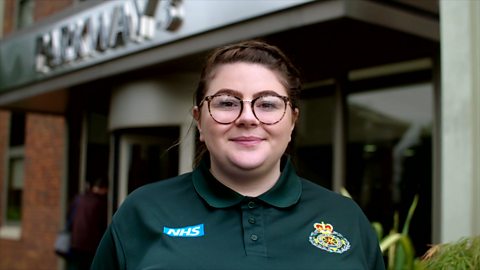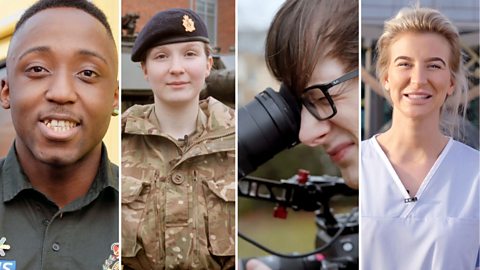Meet Siân, 23, from Chester. She is a community diabetes dietitian in Liverpool.
Part of our Bitesize world of work series.
The best part of the job is when people take on board the advice we give them and they see the benefits.
My name is Siân and I'm a dietitian.
Siân:
Talk me through your usual diet, so from breakfast time.
Patient:
Okay, so I have like three meals a day…
Siân:
A dietitian advises people on their diets and certain nutrients that they need in their diet as well. That can range depending on their clinical conditions. We give advice to people to help them manage their lives and be the healthiest versions of themselves that we can.
(to patient) Would you ever have any fizzy drinks or things like fruit juices or hot chocolate usually?
Patient:
No, I don't tend to.
Siân:
Okay.
My job involves running education sessions and clinic sessions for our patients. This might be also seeing them in their own houses as well, particularly in my role at the moment, I work with people with diabetes and sometimes also producing content for social media around the awareness of diabetes too.
It's definitely the best part of the job when people take on board what we've told them and the advice that we've given and they're seeing the benefit out of it.
(to patient) The idea is to get a good balance of all the nutrients that we need on our plate.
When I was completing my GCSEs at school, I did start researching around different roles that I could do as a job when I grew up, and I came across dietetics. From there, I completed my GCSEs and then went on to do my A-levels in Biology, Chemistry and Psychology, and then I went to the University of Chester to get a degree in Nutrition and Dietetics.
When I applied for this job I completed an application through the NHS Jobs website and then they invite you to an interview if you are successful. I was really excited when my manager called and told me that she wanted me as part of the team.
Emma, employer:
We were looking for someone who would be able to effectively communicate with people from a number of walks of life with different medical conditions and background histories.
Siân:
One job that I did in the past was working in a chip shop, serving people over the counter, preparing their food and things, having conversation with them and I guess in dietetics and being a dietitian, communication is a really big part of what we do, you know, trying to be friendly, polite, but also professional when we are discussing things with patients.
I think particularly as a newly qualified healthcare professional or dietitian, asking for help if you need it from your peers or senior staff is important to help make sure that you are doing the best job that you can for the patient.
I would suggest for students, to make sure that they get a range of the skills that a dietitian needs, so whether that is taking part in extra activities like giving presentations, or going to an extra seminar to develop their knowledge, but also to develop their personal skills to be able to do their job the best that they can.
- Siân is a dietitian, specialising in diabetes. Her role involves conducting education sessions and talking to patients about how to manage their condition with food and lifestyle
- Some of the skills she uses in her role include verbal and written communication skills, numerical skills, IT knowledge and creative skills when planning education sessions
- She always had an interest in nutrition, so she studied Biology, Chemistry and Psychology at A-level, and then completed her degree in Nutrition and Dietetics at the University of Chester
- Siân had a volunteering job as a swimming teacher and also worked part time in a chip shop. She says these roles helped her confidence and gave her experience communicating with people in different settings. This has been valuable in her current role.

What to expect if you want to be a dietitian
- Dietitian average salary: NHS bands [5-7]. Read more about NHS bands. Salaries will differ in private healthcare.
- Dietitan typical working hours: 38 to 40 per week, which could include occasional weekends.
What qualifications do you need to be a dietitian?
You could get into this role via a university degree or an apprenticeship. You may be able to do a dietitian degree apprenticeship.This typically takes 48 months to complete as a mix of workplace learning and academic study at an approved university. On successful completion, you will be eligible for full membership of the British Dietetic Association. You can also work towards the role.
Sources: LMI for All, National Careers Service, NHS Health Careers
This information is a guide and is constantly changing. Please check the National Careers Service website and the NHS Health Careers website for the latest information and all the qualifications needed.
For careers advice in all parts of the UK visit: National Careers Service (England), nidirect (Northern Ireland), My World of Work (Scotland) and Careers Wales (Wales).


The Open University and BBC have been working in partnership for over half a century to provide a unique public service offer covering all four nations of the UK. Each year the OU co-produces a wide range of content for television, audio – radio and Sounds, digital and social with the BBC, including BBC Bitesize.

Careers in healthcare. collection
A collection of stories from people working across the healthcare sector.

Explore healthcare careers with the OU. External Link
THE OPEN UNIVERSITY

More from Bitesize Careers
Hear from young people about the world of work.

